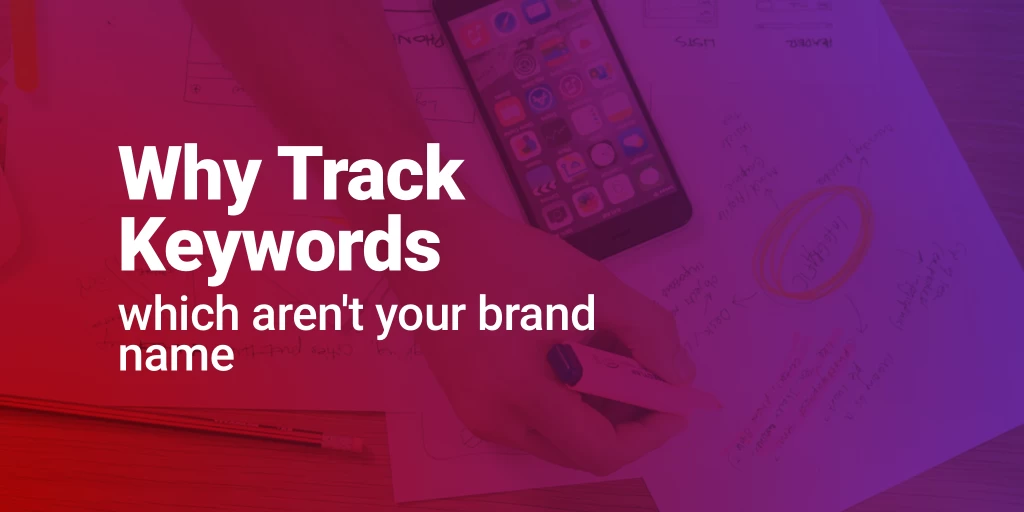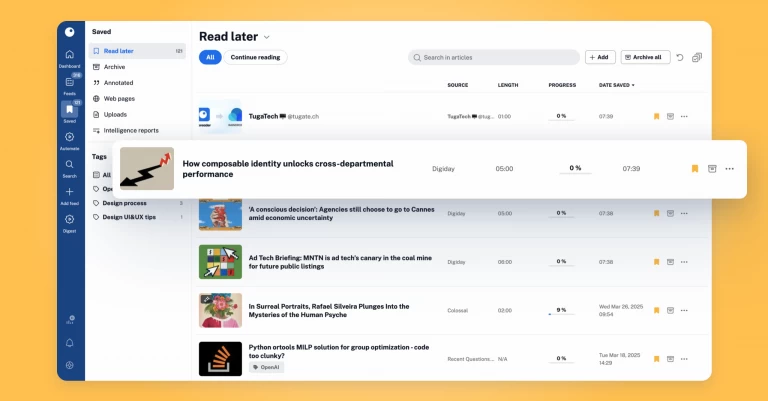Why Do You Need To Track Keywords, Which Are Not Your Brand Name?

New to brand monitoring? You might be tempted to only restrict your research and monitoring to only those direct mentions of your brand and products online. Or maybe you don’t know any better on how to expand your keyword search.
On its own, that’s no small task to accomplish and monitoring tools have the ability to reveal much based on branded keywords alone. You’re wired into active conversations surrounding your brand – invaluable to better plan the future of your company. Marketing relies on customer data and that is what brand monitoring delivers.
However, to be effective you need to be able to understand more about the market and clientele beyond the mention of your name. The Internet has so many sources – blogs, news outlets, pages of all sorts, social media, video transcripts, comments sections – and non-branded keywords crack open a whole new horizon.
Why brand monitoring is a must?
Everyone leaves a digital footprint whether they want to or not – it’s the defining feature of life in the 21st century (alongside the overwhelming velocity of progress). Such a climate requires from companies a certain level of flexibility and quick response times, which no brand can perform with a blindfold wrapped tightly on their head. Effective digital marketing hinges on brand monitoring.
What are people saying about your company and products online? It’s the million-dollar question. The Holy Grail in marketing. Previously, research into uncovering this answer has been costly, but today… You only have to look in the right place. Forewarned is forearmed.
With the right insights taken straight from the customer’s mouth, a brand can forego any guesswork and confidently plan new campaigns or switch their communication style.
Perhaps the most valuable aspect of brand monitoring is that there are no more surprises along the way. You’re not going to be blindsided by a negative reaction or a drop in sales. You won’t step into a scandal or face backlash. You’ll better understand your strengths on the market and then compensate for your weaknesses.
Build a community and engage with your customers
The purely transactional relationship between customer and company has been on a steady decline given the rise of conscious purchasing. Yes, big chains and transnational brands lead markets, but we also see an increase in artisan and boutique options. They are small, local and accessible – just ideal for conscious consumers to establish a conversation with.
Social media monetizes your brand reputation through recommendations, mentions and features in industry-related hashtags. Naturally, the implication is that you ought to cultivate a good name with your customer base. Monitoring on social media draws a through line between you and all the conversations surrounding your brand online.
Don’t just stand there and observe. Be an active force in changing the conversation, if it doesn’t benefit you. Use social media to build an active community through frequent interaction. Direct mentions are not just a resource to gain feedback, but hourly opportunities to prove yourself as a trustworthy company. Brand monitoring also reveals brand advocates – the customers that madly love what you do and stand for, and are not shy about vocalizing their adulation.
Provide better support
Brands succeed and outlast competitors not solely on the strength of product and endorsement, but of what the name itself instills as an association. It can be as simple as ties to particular memories (privy to companies that have survived several generations) or as unidentifiable as a feeling. More than anything today it’s how a company maintains a relationship with their clientele.
Customers are used to – actually expect – direct communication with brands. Perhaps pressure for some companies, but nevertheless an opportunity to prove yourself in a new arena. Reputation is a byproduct of quality, professionalism and care towards your clients.
Following what your customers raise as concerns, critique or question feeds into how to best cater to their needs. A better understanding has a long-term effect on your performance. In the short term, you should enter any and all conversations that require assistance.
A core value proposition in the social-media era should be a customer-first approach – namely, a strong customer support function whether through email and website chats, or on your Twitter and Facebook.
Never lose sight of your competition
Extend the courtesy of brand monitoring to your direct competitors. Yes, it’s essential to breathe life into your brand messaging and fine-tune your core values. Nevertheless, paying attention only to your corner of the market disconnects you from emerging industry trends. What moves your big competitors make creates waves across your industry. Hence, why you should monitor their success and failure in the public arena.
Learn what you can adopt for your own brand to raise your trustworthiness and customer reach. Take note of the choices that have backfired and severely damaged a competitor’s reputation. The lessons await those, who know where to look, and inform how you can redirect your marketing in the long run. Monitoring competing brands opens you up to several insights:
- What do customers respond well to? Are there particular campaigns or gestures online that elicit positive response? What are hooks in sales copy and social media updates that work every time?
- What are customers’ pain points with other competitors? Your enemies’ weaknesses can be your strengths. Also, you learn which shortcomings in your own business to minimize.
- How is the market changing at the moment? Watch enough companies in a single niche or industry over a long-enough period, and you observe overarching trends.
How to monitor your brand?
Where should you start in terms of brand monitoring? A big component of brand monitoring is the immediate feedback you receive on the social media platforms you frequent – Twitter, Facebook, Instagram, YouTube. Seek out the direct mentions, your comments and perform searches on your handles and page names. Close to 70% of all brand mentions are made on Twitter, so you can’t discount its importance.
Beyond social media, you have to focus on other Internet corners where your customer base is the most active. Do they write comments on Quora? Do they regularly post on Reddit and make memes on Imgur? Do they leave reviews on Yelp or Google Reviews? You should have answers to all the questions above to piece together the bigger picture to the public sentiment towards your brand.
Aside from where you should gather these insights, you need to decide what keywords best suit your monitoring goals. A thorough keyword research makes or breaks any marketing tactic, so make your selection wisely.
Branded vs Non-branded keywords
It’s a false dichotomy to choose between branded and non-branded keywords. Brand monitoring benefits from a healthy ratio of both categories for the simple reason you’re controlling the focus. Branded words should be foundational to your monitoring efforts. No marketer worth their salt is going to ignore brand name, slogans, product names, branded hashtags and campaign names. Any and all means a customer might refer to your businesses directly should be on close watch.
Capture even more insights by thinking outside the box. We are all prone to making a typo here or there. What are the common misspellings and variation of your brand name? You will be surprised just how many conversations center around your brand without your knowledge simply because of a wrong key stroke.
Non-branded keywords have inherent value in most marketing tactics such as PPC campaigns and SEO link building. You use the type of products and services, and other industry-specific keywords to reach potential customers who are looking for what you offer, but don’t know of your existence.
In brand monitoring, you’re tapping into relevant (but not specific to your brand) conversation on social media and other online platforms, and gain insights into broader customer attitudes, tastes and preference. Data most suitable to build your value propositions in such a way that you attract and retain customers at improved rates.
The keywords you should track which are not your brand
Are you on board with non-branded keywords? Good. Depending on your size and your approach to online presence, you might want to consider the following categories of keywords to research:
EVENTS: Are your products and services in any way or form associated with a certain type of event? Perhaps if you’re a brand selling halal foods or niche snacks, then food trade fairs and food festivals might be a good place to monitor. People posting about these events are likely to be very qualified as leads and information sources.
EMPLOYEES: A current trend in business overall is to give companies a human touch. You will find that owners and employees in key positions are just as influential in building brand reputation as the quality of your products. These names can become synonymous with your brand, hence why you shouldn’t neglect them.
PERIPHERAL KEYWORDS: Customers turn to social media to ask for recommendations, seek advice on products and exchange experience. These conversations don’t necessarily need to feature a brand or specific product name, but they reveal a lot about consumer behaviors. Another benefit of this type of monitoring arises from the opportunity to insert yourself into a potential customer’s conversation and assist in whatever way possible. Of course, an element of self-promotion cannot be avoided, but the goal remains to create value first and foremost.
Rules and filters to monitor your brand through RSS
Budget constraints create barriers towards utilizing professional monitoring tools. However, you should not despair as there are other means to pursue brand monitoring. RSS stands out as one of the most suitable substitutions. Today’s generation of RSS readers have evolved into full-fledged productivity tools with spectacular filtering capabilities. Exactly what you need to precisely narrow down search results.
Inoreader rises to the occasion with its filtering (more simplistic) and rules functions (a touch more sophisticated). Filters can reduce a site’s feed to only articles that mention your brand name – very useful, if you hope to get a mention on an important industry-related site or news site. Rules give users more control through the if-this-then-that mechanic, which takes the usefulness of the filters and builds on top of it with an output action such as starring, sending a push notification or saving it to Drive.
Why stop there? If you’re well-versed in coding and know your way around complex equations, you will be happy to know Inoreader supports Regex (‘regular expression’). Regex creates search patterns through a sequence of characters (these can be as elaborate and specific as you want them to be), which are then used by string-searching algorithms to locate the thing you’re looking for.


